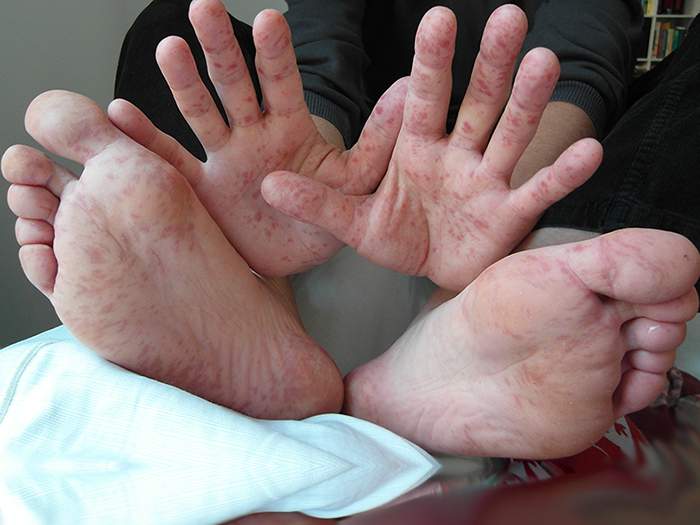Eczema herpeticum is an infection usually caused by the herpes simplex 1 virus or “oral herpes” – the virus that causes cold sores to appear around and inside the mouth. These cold sores can appear on other places on the body, also.
What is Eczema?
Eczema Or Atopic Dermatitis is a rash that causes red, irritated, dry patches of the skin on the affected parts of your body. In most of the cases, the skin condition is termed as atopic dermatitis that causes inflammation and the condition may flare up as soon as it comes in contact with a various allergens. People with eczema are often advised to avoid coming in contact with the triggers. These eczema triggers may include:
- Fragrances
- Soaps & detergents
- Fabrics
- Pollens
- Dust
- Smoke
- Molds
- Environmental changes
- Certain foods and more
Eczema may be a bothersome condition but does not cause any serious complication until it comes in contact with the herpes virus causing a serious skin condition known as eczema herpeticum.
What is Eczema Herpeticum?
A serious and widespread viral infection of the skin. When herpes and eczema combine, it causes a rare but fatal skin infection called ‘Eczema herpeticum’. It is also known as Pustulosis varioliformis acute, Kaposi varicelliform eruption, and Kaposi varicelliform eruption. The condition was first explained by Moritz Kaposi in 1880’s. Eczema herpeticum is a form of viral infection brought about by herpes simplex virus (HSV) type-1 or 2 that usually worsens the case of pre existing atopic dermatitis in an individual. The HSV type-1 virus causes blistery rashes and it can be commonly seen in an any individual regardless of the gender, age or race. The rashes caused by type-1 or type-2 viruses can be instantly spread all over the body.
What is Herpes Simplex Virus?

- Herpes simplex virus type 1: HSV-1 is also called as oral herpes that commonly causes cold sores. HSV-1 is caused by non-sexual contact, like sharing lip balms, lipsticks, utensils or an act of kissing. According to World Health Organization, approx. 67 percent of people under age of 50 have HSV-1 globally. The virus can spread by oral sex and can also cause genital herpes in some cases.
- Herpes simplex virus type 2: HSV-2 is also called as genital herpes. HSV 2 virus spreads through the sexual contact with an infected person. The condition can be characterized by the blisters on genital area. It may be further spread to the baby during the childbirth if mother is infected by this condition.
Eczema herpeticum can be a life threatening condition in babies. People who have breaks in their skins, such as due to burns, allergies or some other skin conditions are more prone to the this skin infection. It may occur on the neck, head, eyes, and hands.
Eczema Herpeticum Symptoms
Most commonly the symptoms of Eczema herpeticum can be seen in the people with a weakened immune system. The symptoms may show up 5 to 12 days later after the exposure to genital herpes or cold sores.The symptoms generally include:
- formation of small blisters in a cluster
- body inflammation with a severe pain
- water-filled blisters that bleed and infects the surrounding area
- high fever
- nausea
- chills and decreased appetite
Within 9-10 days you may feel see pus-filled and crusty patches on the skin. If not treated properly these may bleed severely making the condition worse.
Diagnosis for Eczema Herpeticum
There are various tests for diagnosing the skin condition. Patients must be diagnosed at an early stages in order to treat the condition effectively.
- Polymerase Chain Reaction sequencing (PCR): PCR is a technique used in molecular biology that allows to analyze short sequences of DNA or RNA. Any traces of viral DNA in the tissues can be easily diagnosed by PCR sequencing.
- Direct fluorescent antibody test: It is one of the rapid and accurate test performed to identify the viral infection. Also known a ‘directimmunofluroscence’ test. Direct immunofluorescence is effectively used to detect the immuboglobulins and complement protein deposits in biopsies of kidney, skin and other organs.
- Tzank smear test: The test is named after a Russian dermatologist Arnault Tzanck (1886-1954). A fluid from a blister is carefully examined to find the presence of Tzank cells. Tzanck cells are multinucleated giant cells commonly foumd in Herpes zoster, varicells and Herpes simplex.
- Bacterial swabs must be taken for microscopy: Eczema herpeticum may be diagnosed physically but it could be easily mistaken for severe eczema flareups or the bacterial infections. A bacterial swab from a blister must be taken to diagnose the skin infection.
How to Prevent Eczema Herpeticum?
One of the best ways how to prevent Eczema herpeticum is to keep eczema symptoms at a bay and take effective measures to avoid HSV infections. The following tips may help you to control or manage the skin condition.
If you are suffering from eczema:
- Avoid coming in contact with someone who has cold sores.
- Avoid using anything that has touched the mouth of an individual with a cold sore.
- Avoid eczema triggers.
- Keep proper track of eczema symptoms.
- Wash your hands frequently.
- Avoid sexual contact with an individual who has genital herpes.
- Use latex condoms during sexual intercourse.
- Avoid scratching the skin as it may worsen the skin condition.
- Moisturize throughout the day.
Eczema Herpeticum Treatment?
Eczema herpeticum is treated using antiviral drugs/medications like Valtrax or Zovirax. These drugs can help fight against viruses that cause the Eczema herpeticum infection.These drugs may be given in intravenous forms or orally if the condition is severe. Your doctor may also give you antibiotics as a precautionary measure.
For further references:
https://www.ncbi.nlm.nih.gov/pmc/articles/PMC3520662/
http://journals.lww.com/md-journal/fulltext/2016/07190/Oral_treatment_with_valacyclovir_for.39.aspx
Consult your doctor immediately if you see any blistery rash on the skin accompanied by other symptoms discussed above. Managing your eczema symptoms is not only important for your lifestyle but also for keeping serious skin infections at bay. Keep your skin healthy and hydrated to avoid any illness caused by various kind of unwanted microorganisms like viruses, fungi, bacteria, and so on.
Managing eczema is not only important for comfort, but also for preventing a serious skin infection. Keeping the skin healthy and unbroken helps the body keep out unwanted viruses and bacteria that can cause illness.
If you enjoyed reading this article, you might also like:
- Weeping Eczema – 9 Home Remedies That Really Work
- Follicular Eczema & Causes, Symptoms, Treatment, & Prevention
- Stasis Dermatitis(Legs Eczema)- Its Symptoms, Causes and Treatment
- Eczema And Stress: Can Stress Trigger Eczema?
- Eczema and Skin Infections
- 4 Natural Remedies For Eczema Infections
- 9 Home Remedies to Control Eczema Symptoms & Prevent Flare-ups





